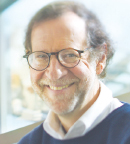CITY OF HOPE announced recently that it received its third lymphoma Specialized Programs of Research Excellence (SPORE) grant from the National Cancer Institute (NCI). The grant covers a 5-year period and totals $12.5 million.
SPORE grants involve both basic as well as clinical and applied scientists in supporting projects that will result in new and diverse approaches to the prevention, early detection, diagnosis, and treatment of cancers.

Larry W. Kwak, MD, PhD
“City of Hope will do this by developing novel therapeutics and prognostics… [developed] from observations in molecular biology and cellular immunology at City of Hope,” said Larry W. Kwak, MD, PhD, Vice President and Deputy Director of City of Hope’s Comprehensive Cancer Center; Director of the Toni Stephenson Lymphoma Center; and the Dr. Michael Friedman Professor in Translational Medicine. “Six clinical trials are proposed in this grant, five of which utilize agents [cellular products, small molecules, radiolabeled antibodies] that will be produced at City of Hope in its Good Manufacturing Practice Manufacturing Core and have been developed from the institution’s preclinical laboratory studies.”

Stephen J. Forman, MD
The grant is led by Dr. Kwak and Stephen J. Forman, MD, City of Hope Francis & Kathleen McNamara Distinguished Chair in Hematology and Hematopoietic Cell Transplantation and Leader of the Hematologic Malignancies and Stem Cell Transplantation Institute, as multiprincipal investigators. This is the 11th year City of Hope has received funding from the NCI for a lymphoma SPORE grant.
Over the next 5 years, City of Hope doctors and researchers, as well as scientists from other institutions, will focus on the following projects for the SPORE grant:
For patients with relapsed non-Hodgkin lymphoma (NHL) or who are unable to receive a transplant, City of Hope plans to build upon the results of a clinical trial they conducted during the previous round of SPORE funding. There will be three trial designs in which researchers plan to add the Triplex vaccine to the combination of hematopoietic stem cell transplants and CD19 chimeric antigen receptor (CAR) T-cell therapy.
One trial, led by Alex Herrera, MD, City of Hope Assistant Professor in Hematology and Hematopoietic Cell Transplantation, is a response-adapted sequential therapy using nivolumab and ifosfamide/carboplatin/ etoposide phosphate chemotherapy.
The second trial, led by Eileen Smith, MD, City of Hope Associate Director of the Clinical Research Program, Department of Hematology & Hematopoietic Cell Transplantation, uses an anti-CD25 antibody immunoconjugate to augment high-dose chemotherapy, an autologous stem cell transplant, and radiation targeting a tumor’s microenvironment.
Hua Yu, PhD, City of Hope’s Billy and Audrey L. Wilder Professor in Tumor Immunotherapy and Co-Leader of the Cancer Immunotherapeutics Program, and Marcin Kortylewski, PhD, Associate Professor of the Department of Immuno-Oncology, will test a phase I immunotherapy drug (CpG-STAT3siRNA) that targets STAT3; patients will also receive low-dose radiation therapy to augment the new drug. Elizabeth Budde, MD, PhD, Assistant Professor of the Department of Hematology & Hematopoietic Cell Transplantation at City of Hope, is the project’s clinical principal investigator.
Smita Bhatia, MD, MPH, and Ravi Bhatia, MD, of the University of Alabama, Birmingham, and Dr. Forman are leading research to develop a prediction model that includes clinical and genetic details to determine the probability of a patient’s risk of developing therapy-related myelodysplasia/acute myeloid leukemia. The research will help identify which patients are at risk and what a medical team can do to personalize treatment and help prevent a patient from developing the disease. ■

